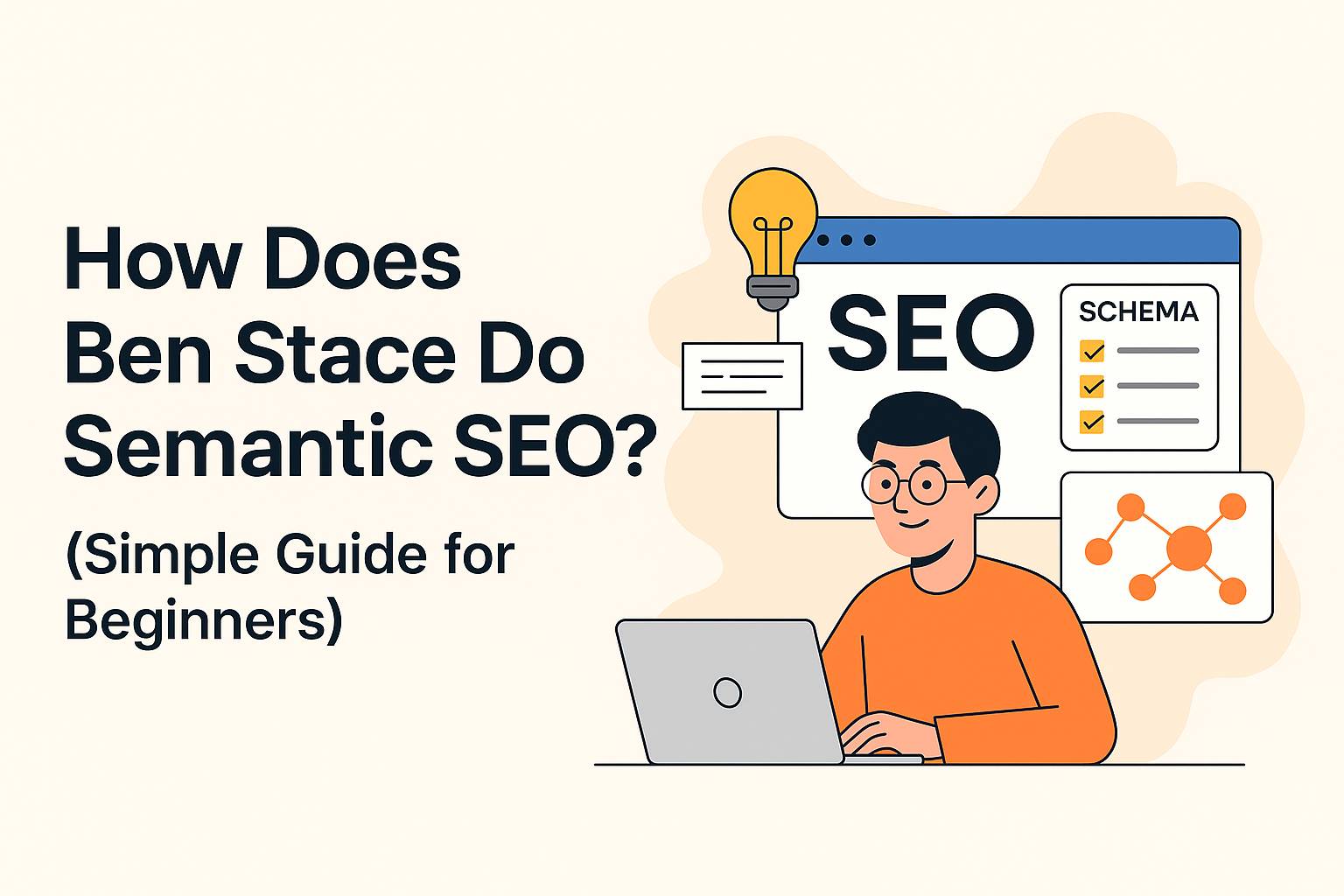Getting your website to rank highly on Google in the modern digital world requires more than just using the right keywords; it also requires knowing what people actually want and providing them with comprehensive, helpful answers.
Ben Stace, a semantic SEO expert, is one person who excels at this. He is renowned for helping websites rank higher by employing a clever technique known as semantic SEO.
Ben Stace, a semantic SEO expert, is one person who excels at this. He is renowned for helping websites rank higher by employing a clever technique known as semantic SEO.
But what is semantic SEO? And how does Ben Stas do semantic SEO so well? This question, also asked on Quora, is of considerable importance.
Let’s find out in this easy guide.
🧠 What Is Semantic SEO?
Writing and structuring your website content in a way that allows Google to comprehend its true meaning, not just its keywords, is known as semantic SEO.
✅ Traditional SEO vs Semantic SEO
| Traditional SEO | Semantic SEO |
| Focuses on single keywords | Focuses on full topics and meanings |
| Repeats keywords many times | Answers real questions users ask |
| Short articles | Deep, helpful, and complete content |
| No structure | Organized with headings and links |
Semantic SEO helps search engines understand the meaning and context of your content, not just keywords. It focuses on related topics and user intent, making your content more complete and likely to rank higher than with traditional keyword-only SEO.
👨💻 Who Is Ben Stace?
Semantic SEO is the specialty of Ben Stace. He is a full-stack developer and SEO consultant who uses clever tactics to help websites rank on Google. How to do SEO for other search engines according to Neil Patel.
As a well-known semantic SEO consultant, Ben Stace provides services to customers seeking methodical, significant SEO enhancements.
Ben is featured on big SEO websites like:
- JamesDooley.com
- FatRank.com
- SemanticSEO.com
- His own site
He provides brands, bloggers, and agencies seeking to scale organic traffic through sophisticated content models with Ben Stace semantic SEO consulting services.
He has also created his own tools to make SEO better and faster.
🚀 How Does Ben Stace Do Semantic SEO?
Let’s look at the steps Ben uses to do semantic SEO:
1️⃣ He Builds a “Topic Map”
Ben doesn't write a single piece of content for a single keyword. Rather, he makes a map of subjects that are connected to the main topic.
For example, if the topic is “Dog Food,” he will also cover:
- Best dog food for puppies
- Dog food allergies
- Homemade dog food
- Wet vs dry dog food
Because of this structure, Ben Stace creates powerful semantic content networks that enhance Google's comprehension of a website's subject-matter authority.
2️⃣ He Focuses on “Entities,” Not Just Words
An entity is a real thing that Google understands, like:
- Brands (like Nike, Samsung)
- People (like Elon Musk)
- Places (like New York, Amazon River)
Ben adds brand names, types, and uses in addition to the term "running shoes" to make the content easier for Google to comprehend.
3️⃣ He Plans Before Writing
Before writing, Ben creates a plan for the article. This plan includes:
- What questions people ask on Google
- What important topics to include
- What subheadings to use
- Which related articles to link to
This makes the content organized and complete.
4️⃣ He Uses His Own Tools
Ben has built tools like:
- Semantic SEO Writer
This program, called the Ben Stace Semantic SEO Writing Tool, assists authors in creating organized articles with relevant subjects and entities.
- Semantic Scan
This tool checks if content:
- Answers the right questions
- Misses important topics
- Can be improved for SEO
These tools save time and make articles more powerful.
5️⃣ He Adds Smart Internal Links
Ben connects related articles together by using internal links. This helps:
- Google find all your pages
- Users stay longer on your site
- Boost SEO for more keywords
He links main topics with subtopics, like a tree with branches.
6️⃣ He Uses Schema Markup
Ben adds special code to websites called schema markup. This helps Google:
- Show FAQs in search results
- Display stars, images, and other rich results
- Understand the content better
You don’t see schema on the page, but Google does.
7️⃣ He Updates Content Regularly
Ben doesn’t just publish articles and forget them. He checks and updates them every few months to:
- Add new questions
- Improve answers
- Stay ahead of competitors
This keeps the content fresh and trusted by Google.
🔍 Why Ben Stace’s SEO Method Works So Well
| Benefit | Why It Matters |
| Covers full topics | Google sees your site as an expert |
| Answers user questions | Visitors find real value |
| Uses entities & schema | Google understands content better |
| Organized & complete content | Ranks for many keywords |
| Regular updates | Stays relevant and high-ranking |
✅ Example: How It Works in Real Life
Let’s say Ben is writing about "Best Dog Food for Allergies". Here’s what he would do:
- Create a topic map: include allergy symptoms, common foods, vet advice, etc.
- Mention entities: dog food brands, ingredients, allergy types
- Write detailed content: answer common questions, give examples
- Add internal links: link to related topics like "Dog Food for Picky Eaters"
- Use schema markup: add FAQ schema so answers show in Google search
Because of this, the article could rank for many different search terms, not just one!
🙋♂️ What You Can Learn from Ben Stace
You can also apply Ben’s methods to your own website. Here’s how:
- Think in topics, not just single keywords
- Write helpful and complete content
- Use entities and brand names
- Add internal links to related pages
- Use FAQ and article schema
- Keep your content updated
Or you can hire ben stace for semantic seo to get direct help building content that truly ranks.
You can use free tools like Google Search, Google's "People Also Ask," and Google Trends to accomplish the same tasks even if you don't have his tools.
❓ FAQ: Ben Stace & Semantic SEO
Q1: Is Ben Stace’s method good for beginners?
Yes! His method is simple: create helpful content that covers the topic completely.
Q2: Do I need to be a developer to use semantic SEO?
No. While Ben is a developer, his strategy can be used by anyone — writers, bloggers, or SEO beginners.
Q3: Can I use free tools to do semantic SEO?
Yes. You can start with tools like:
Google Search
Google Trends
AlsoAsked
AnswerThePublic
Q4: How long does it take to see results?
If you follow the steps properly and update your content regularly, you may start seeing improvements in 1–3 months depending on your website and niche.
Q5: Is semantic SEO better than regular SEO?
Yes. Semantic SEO is the future of SEO. It helps you rank for more keywords, gives users better content, and makes Google trust your website more.
📝 Last Remarks
Ben Stace helps websites rank higher and grow more quickly by using semantic SEO. Many people in the SEO industry trust his method because it is comprehensive, intelligent, and reliable.
To follow his process, you don't need to be an expert. Just concentrate on:
- Helping your users
- Covering full topics
- Writing clear and complete content
- Keeping everything updated
Want help applying semantic SEO to your site?
👉 Contact backlinko.online — We follow the same expert process and can help your business grow online.



